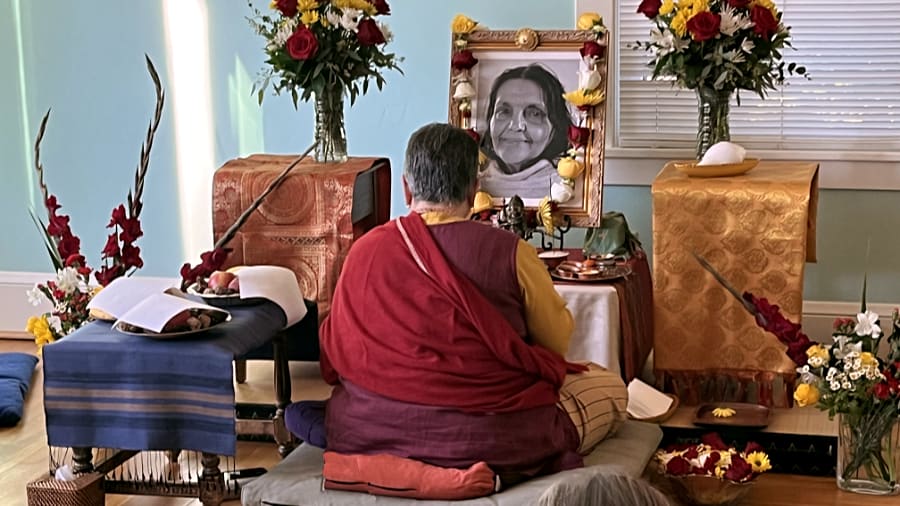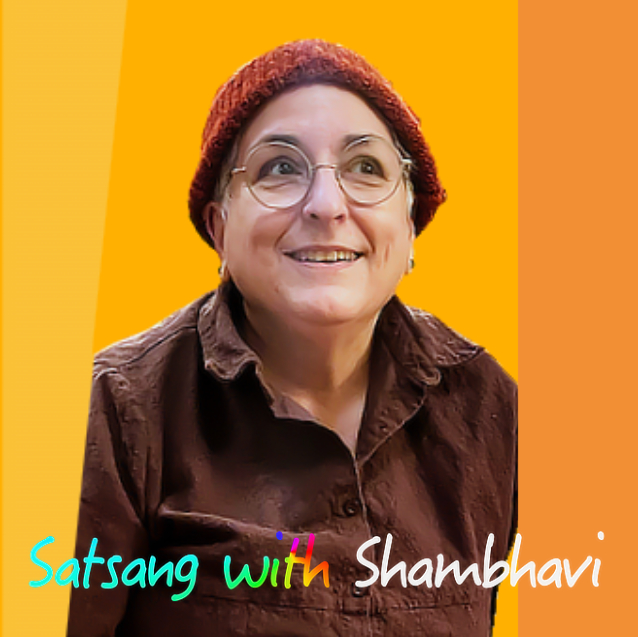Shambhavi and the Jaya Kula community gather for satsang and get real about all the questions we humans want answered. Intimate, courageous, heartfelt spiritual talk about pretty much everything. So happy you are here! A podcast from Satsang with Shambhavi
STUDENT 1
I was wondering—guru disciple lineage thing, when does a disciple know that they're like a guru, ready to have a disciple?
SHAMBHAVI
It's really unanswerable because it's not like someone decides they're ready to be a guru. Guru means heavy, and it means someone who does what is needed to help you to recognize and eventually become immersed with awareness in your real nature. And there is no guru without disciple.
So there's a co-arising. Nobody can say I'm a guru. Anyone who declares I'm a guru— from my perspective, that is fairly inane. So basically it's just something that is rare and that happens that someone has the capacity to help other people recognize their real nature through practical and mystical means. And then that someone else would want that person to serve in that position for them.
Those are not common occurrences. So we can have all other kinds of teachers—teachers that aren't necessarily gurus—that are very, very useful.
STUDENT 2
Is the guru principal in all lokas?
SHAMBHAVI
Yes, depending on what form we show up in. We have different capacities, so not everyone in this realm has the same capacity. Not all human beings have the same capacity. The same goes for other realm beings, titans and demons and animals and et cetera.
But there's some capacity and some possibility of having more awareness in every realm and every form of embodiment. And that principle is the principle that moves us toward that. The guru principle, the Guru Tattva, moves us toward that, and so it's not absent from anywhere.
The guru principle is— there's a lot of different ways to talk about it, but one of them is as Sadashiva, the tattva that is right under Shiva-Shakti, right? Which is the principle of the field of compassion.
And what is that field of compassion? That field of compassion, first and foremost, is underlying this movement toward waking up. It is an expression of that compassion. And Sadashiva is considered to be the guru principle as it's cascading from Paramashiva.
STUDENT 3
Can you talk about guru as heavy?
SHAMBHAVI
You don't know? [laughter]
There's a fierceness that is inherent in relating to someone. Guru is also your innate clarity. Guru is also all circumstances that you encounter.
And then for most people who actually relate to someone else as guru, which is very few people, guru does whatever it takes by any means necessary to help you wake up. That's the job description.
So it implies heaviness, it implies— fierceness is what is meant, really. Coming down on you, coming down on your karmas. That's why most people don't have gurus.
Removing the cataracts. There's a wonderful line, I think, in the Guru Stotram—puts drops in your eyes that sting, but remove the cataracts so that you can see clearly. And of course, those who are ready for that, who are ripe, will run toward that, and everyone else will run away.
There's lots of ways of relating to guru. You can have someone that other people recognize as a guru. There's lots of teachers that people say oh, that guru so-and-so. And then maybe you see other people relating to them and then someone says oh, they're my guru. But they're not really in a guru-disciple relationship.
They're just in a teacher-student relationship with somebody that other people are relating to as guru. Or that's not happening at all. Just somebody has that title. But in my experience, very few people are really down for that in any particular lifetime.
Even someone as great as Ma, people were afraid of her. When they would come and ask her will you be my guru? She would ask them three times, will you do anything I ask you to do? And by the third time, most of them said no. And so you can imagine what look she was giving them.
If someone just said, in an ordinary tone of voice, will you do everything I ask, maybe you would say yes. But I'm sure she was, like, piercing them in some way or another, right, that they got what that really meant! And so by the second or third time, they're like, okay, no.
People in these kinds of traditions, they have one disciple. Like Patrul Rinpoche, one of my favorite, favorite Buddhist teachers, had one disciple, this guy that was with him for 50 years and took care of him and studied [...]. When he was 50 years old, Patrul kicked him out and said now you have to go teach. 50 years!
And everybody else was very devoted, or there were many very devoted others who were learning, but that's different. It's a little different.
But these days people want to skip over being a student to be a guru, or they want to claim they have a great guru, but they're not willing to be a disciple. Everything just becomes a spiritual accoutrement or some sort of accomplishment or brand or something. That gets you nowhere.
STUDENT 4
I just wondered if you could speak into one of the sutras in the Recognition Sutras. Number 14, "The fire of awareness, although obscured in its descended state, still partially consumes the kindling of knowable objects."
SHAMBHAVI
What that's saying is that even if we're limited and we have only partial access to the fire of awareness, that whatever access we do have still is helping us to burn what needs to be burned.
This is a very famous sutra, and there's been a lot of commentary and discussion on this over the years, but it basically is a statement of mercy that we don't have to be totally enlightened in order to be moving forward with gaining more knowledge of the self and of how things really are.
If we have even any fire of awareness, if we have any tejas, if we have any insight, if we have any relationship to transmission, then that is going to help us to consume our conceptual way of relating to things and whatever is obscuring our clear seeing and knowledge that is not limited knowledge.
Though Abhinavagupta, and Trika Shaivism in general, makes a distinction between ordinary knowing and knowledge of the Self or knowledge of how things really are. Then the second sutra of the Shiva Sutras, jñānam bandaḥ, says knowledge is bondage. That is a statement that is mystifying to someone who's not in a tradition like this.
How could knowledge be bondage? Aren't we trying to know stuff? Aren't we trying to understand stuff? So what that means in the context of Trika Shaivism is that our conceptual and limited knowing that we have attachment to is bondage.
So the very things that we think we know, and our limited explanations for things and our limited concepts that we're so happy about and take so much pains to acquire and show off to other people, that these things are bondage.
And eventually we have real discernment. We have real knowledge, real wisdom, access to wisdom. So the fire of awareness is going to burn up our limited concepts of knowledge, our limited relationship to objects of understanding, and eventually even a small amount of that fire will be helpful.
So this is mercy. It's mercy that we can start with very little and still progress.
STUDENT 5
I was wondering if you could talk about holding nonconcept and the difference between that and hedonism.
SHAMBHAVI
Well, you don't really hold nonconcept. You almost have to slip into it. It's the in-between. Hedonism is an attachment to certain kinds of pleasure. So, I mean, it's an example of one among many examples of various kinds of attachments and concepts and ideas of good and bad and desirable and undesirable.
And hedonism implies a kind of compulsion that you're always seeking some particular kind of pleasure. So I don't even really see how one could think they were similar enough to ask how are they different?
STUDENT 5
I feel like in Jaya Kula there's the conduct that's followed in certain ways and certain language and like moral code that people move by. But we're also talking about nonconceptuality.
SHAMBHAVI
Well, we're not following a moral code. Absolutely not. We're following precepts that help us to practically and functionally manage energy so that we can do practice and have more fruit from practice. So that we can incur less entanglement in complex, karmically compelled situations.
Any kind of rule or precept that we're following is entirely functional and sort of aimed at helping us to be more free and to have more fruit from our sadhana.
So there's absolutely no moral or ethical code involved. But functionality is really at the crux of it. When we are really resting in our real nature, and we could say unconditioned rather than nonconceptual, I think would be a better way of saying that—unconditioned by concept, by past, present and future—to whatever extent anyone's able to do that, what does that mean?
It means that you are immersed in wisdom. So we say this reality is made of consciousness and energy, but that is not the best description. It's really made of wisdom, it's made of the wisdom of this supreme Self. So when we are resting in our real nature unconditioned, we are totally expressive of that wisdom, and anything that we do in that condition is beneficial.
So it's benefit without any possibility of faltering from that. That would be if one were totally realized. But of course none of us are, so we do falter.
But to whatever extent we are able to feel our real nature and be immersed in that, then what we're doing is of benefit. It doesn't matter if it's ordinary behavior or some other kind of behavior that we think of as extraordinary.
And in that state there is no need for precepts. Not because we've just thrown caution to the winds, not because we're being hedonistic, but because we no longer need those guideposts in order to preserve and move toward more freedom because we already are in a state of total freedom.
So we don't functionally need those things anymore, but it doesn't mean that we've just thrown it all out the window and are doing anything like ordinary people do that might be harmful. So it's just functionally no longer needed because we're embodying that goodness, that sweetness, that tenderness, that wisdom, that clarity naturally without any effort.
So the precepts represent effort that, as Ma said, leads to effortless being. Eventually we move from the effort of sadhana and precepts and all our efforts that we make. Eventually— the point of all that effort is that we would enter into a state of effortless being at some point.
In terms of the other question about sometimes you wish you could just throw out all the rules of Ayurveda and do whatever occurs to you, I understand that feeling, but from the perspective of my experience, when we're going to enter into a state of improvisation with any wisdom tradition, whether it's Ayurveda or something else, then that comes out of all of the knowledge that we've gained studying more conventionally in that tradition.
So for instance, when I do healing sessions with people, I'm not just like oh, whatever, let me just forget everything I've learned and do whatever. Everything that I'm doing arose out of decades of doing formal practice with channels and energy and mantra and chakras and all that stuff.
So yes, I'm improvising, but that improvisation is totally utilizing everything that I learned and the sensitivity that you might have, for instance, to someone's state to be able to feel what herb they might like or what the treatment should be. The sensitivity comes out of doing the practice in a more guided, effortful, formal way.
I would never have the sensitivity I have to work with people in a subtle, energetic way if I hadn't done all that formal practice. Where would I have gotten the sensitivity to do that? It came out of all that formal practice.
So I think that when we're at that state where we can improvise, it feels very different than fuck it. Just to be blunt, it feels very different than fuck it. It doesn't feel like fuck it at all. It feels like something like jazz.
I have much more limited training in Ayurveda than you, but I have some very weird and inexplicable sensitivity to herbs. So I've always been able to make formulas for people that were inexplicably successful. Like if you just looked at my training, you'd be like how did she do that?
But there's something there from the training I have had, and maybe from a past life, that I'm drawing on. And there's like a sense of being told what to do. Not fuck it, I'll just make it up, or I'll just do what I want to do.
I don't have any sense I'm doing what I want to do. That doesn't even enter into it. It's more like something is just told, and it's not a very loud telling, it's something very subtle.
STUDENT 6
On the topic of improvisation, could you just talk a little bit about what the kheyal of Ma was?
SHAMBHAVI
What she meant by it was that she was totally immersed in living wisdom, and she was in a state of listening and being moved by what she heard, and that was it.
She heard, we could say, the music of God, or she was that music, who knows? And she was moved by it, and she didn't do anything unless she was moved. So that's what kheyal means.
Just like if you were in an improvisational duet with somebody and everybody stopped playing, no one would be moved. Improvisation implies intense listening. It's a very special and beautiful kind of listening when you're doing improvisation.
So there's listening and there's being moved to respond. That's what she meant by it.
And so sometimes she said I have the kheyal to do something. Other times she said I don't have the kheyal to do something. And what she meant was nothing has moved me to do that, so I'm not doing anything. And if she did something, then that was because something moved her to do that. She was totally immersed and in a state of utter responsivity.
SPEAKER 7
I'm thinking about having a guru and then gods and goddesses.
SHAMBHAVI
In this tradition and this kind of tradition, deities aren't gurus. If I were to say my guru is an embodiment of Shiva, we all are. That's really not saying that much from my perspective in this kind of tradition.
There's different levels of communication. There's the kind of speech that's coming out of my mouth right now that's very, very easy to hear. There's the kind of speech we have in our mind when we're thinking about something that's more subtle. There's more subtle communication that we call transmission.
And then there's other infinite, infinite subtle communications. And some of those communications you could say are communications from dakinis, from yoginis, from mahasiddhas, from teachers that are no longer embodied the way that we experience them on Earth, from deities, from God-knows-what, just wisdom itself.
So those kind of communications are more subtle generally, although not always, because we could also think of every circumstance as a communication from the divine. So if you get hit by a car, that's not a very subtle communication.
But of course, there's subtle speech, there's mantra. How do we relate to mantra as subtle speech? Some people are totally bored by mantra. Other people have really profound experiences with mantra. That is an aspect of our receptivity to subtle speech.
So yes, there's infinite, infinite, infinite different kinds of communications we could call speech. And our state of our body, energy, and mind is determinative in some ways, not totally, but in some ways, of whether we're going to notice that at all and then what we're going to do with it if we do notice it.
Sign up to receive email updates
Enter your name and email address below and I'll send you periodic updates about the podcast.


